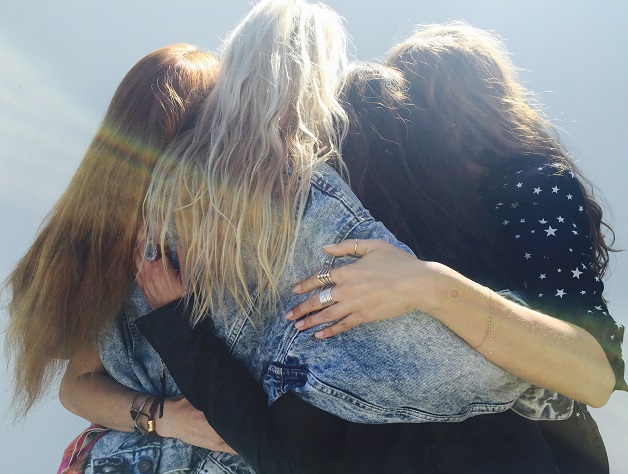
To all my sisters, near and far:
I want to say: I’m sorry.
I’m sorry that I have barricaded my heart and prevented you from loving me through what may seem like an impenetrable shield that I unconsciously created.
I’m sorry for keeping you at a distance as I navigate my way through, what feels like, the fires of hell.
I’m sorry for believing that you cannot handle my pain, that you are not equipped to support me in this time of tumult, that you wouldn’t understand what it is I am going through.
I have not wanted to subject you to my anguish, so I’ve worked hard to keep you safe from the hurt I am feeling. And yet, my trying to keep you safe is undermining your potent strength.
Who am I to say that you are not strong enough to handle my storm?
Who am I to assume that you wouldn’t comprehend what it is that I endure?
Who am I to stand in your way of loving me through this f*cking mess?
I wonder, where the truth is in the oscillation between receiving support from others and being responsible for one’s own journey?
It’s a fine line that I am constantly navigating and when I am not mindful I can fall too far to one end of the spectrum and lose myself to the extreme.
Currently, my being responsible for my experience has turned to isolation and disconnection from all of you.
I have been a victim in the past—I have wallowed my way through my pain and have gotten lost in the upheaval of my broken heart. I have turned to vices to help me through the agony because I was incapable of rising strong from an empowered place. I have depended on the strength of others to fix me as I didn’t believe in my own power to find my way.
And so, as I write these words, I realize that I still fear the illusory defeat of my own demise and so I maintain a separation from others so to not repeat my past.
I can say that I am not a victim anymore, and yet, my aversion to that role tells me that she (the victim) is still active within me, leaving her thumbprint on the choices that I make without my even knowing it.
Self-imposed alienation is merely the other side of the “victim coin.” I may not be wallowing or over-identifying with suffering, but to disconnect and believe in the delusion of separation is to victimize myself and negate self-compassion.
I know how to feel.
I know how to grieve.
I know how to support myself.
And I know how to rise through the wreckage.
But can I do so in your gorgeous presence without the overwhelm of shame?
Can I allow you to be my allies throughout this challenging time?
Can I trust in your strength to hold me through my breakdown?
Can I reveal the ugliness of my grief and not have to keep it together in order for you to love me?
Can I become undone in front of you and not have to fix anything, knowing that I will not lose myself to the pandemonium of my shattering heart?
In studying Dr. Kristen Neff’s research on self-compassion, I realize that I have neglected an integral component of her definition. While I have mastered the art of self-kindness versus self-judgment—of being mindful versus over-identifying with my feelings of grief—I have disregarded the importance of common humanity and inadvertently turned to isolation.
I now see that this stems from my own mistaken belief that being witnessed in a sloppy state of grief (i.e. common humanity) is irrefutably synonymous with becoming a victim to my circumstance.
False.
I forgive myself for ever buying into that, and I apologize for holding you at bay as a result.
To heal the feminine collective is to remove our masks, to divulge our messy truths, to unapologetically stand in our vulnerability, to become undone before each other, to fiercely love, fully accept and unabashedly receive from one another.
That is why we are here.
And so, I welcome your love, your nourishment, your strength and your divine femininity, as I reveal my breaking heart to you, without ever needing you to fix it.
~
Author: Jessica Winterstern
Image: Author’s own.
Editor: Nicole Cameron










Read 0 comments and reply